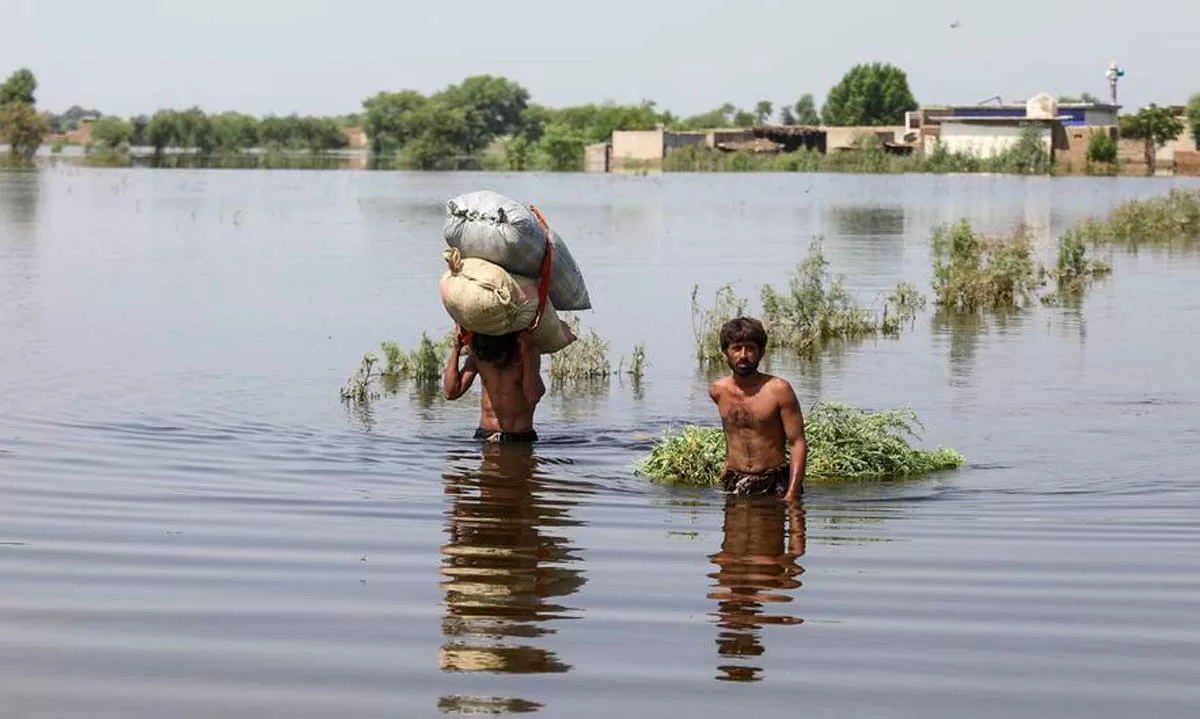When the 2025 cloudburst hit Buner, a district located in northern Pakistan, villagers described how torrents of water came down upon their dwellings with such fury as never before seen. Entire settlements vanished behind walls of mud and rock. Survivors stood amidst the rubble of their houses, blaming fate, blaming climate change, and waiting for relief from the provincial government. But the mountains behind them spoke a different tale. Its slopes, stripped of forests and scarred by marble quarries, had long been preparing for this disaster.
Khyber Pakhtunkhwa is a province in northern Pakistan where the marble industry has grown very fast. By 2023, more than 6,000 marble factories were working in that province. These factories were mostly found in the Buner, Mardan, Swabi, Malakand, and Mansehra areas and also in the industrial belt on Warsak Road up to Mohmand and Bajaur. In just one city area alone, there were 350 units that Peshawar hosted. Yet alongside this economic boom came a quieter tragedy: about 1,091 units reportedly ran without environmental clearance from the Khyber Pakhtunkhwa Environmental Protection Agency (EPA). Only 133 factories held the required no-objection certificates (NOCs). The rest continued to blast mountains, dump slurry, and strip forests unchecked.
The ecological costs have been devastating. Global Forest Watch figures demonstrate that Khyber Pakhtunkhwa lost an average of 4,690 hectares in tree cover per year between 2020 and 2024. Swat’s forest cover, which at one time was 30 percent in 1947, has now decreased to just about 15 percent in 2025. Deforestation led by marble quarry expansion and firewood extraction that caters to the needs of the urbanizing population results in barren slopes replacing natural watersheds. Mountain blasting destroys soil structure, leading to erosion and reducing the water absorption capacity of the land, thereby ensuring flash floods accompanied by landslides with every spell of heavy rain. The Buner flood was not a natural calamity, but rather it was the net result of years of environmental neglect by the PTI government.
Villagers, whose words seldom reach the ears of policymakers, tell of dry streams, washed-away topsoil, and lost animal corridors that happen when the forest disappears. Farmers watch their yields decline while factory owners argue the industry brings jobs and export earnings Pakistan needs. Yet the floods that now strike with greater intensity destroy far more than they ever build.
Here, the climate debate takes a dangerous turn. Pakistan is right to point out that it happens to be among the top five most climate-vulnerable countries while contributing less than one percent to global carbon emissions. But local actions—unregulated mining, illegal riverbed construction, and deforestation—weigh heavily in magnifying the impacts of a changing climate. Extreme weather may be global, yet the scale of destruction in places like Swat and Buner reflects local choices as much as global injustice.
What makes this tragedy sharper is the economic paradox at its core. The marble industry contributes almost $1.5 billion every year to the economy of Pakistan, and it is this region that supplies a major portion of exports from the country. But this same industry depletes those very ecosystems on which agriculture, tourism, and rural livelihoods depend. When floods destroy the crops, roads, and houses, the damage is more than what profits could be made out of marble extraction, hence leaving the communities in a cycle that has economic gains disappearing with ecological losses.
The provincial government’s unwillingness to act sits at the heart of the crisis, permitting unregulated factories to function as environmental grey zones. The provincial EPA remains underfunded and politically sidelined. Deforestation bans exist on paper but are rarely enforced. Mining royalties swell provincial coffers, while watershed restoration receives scant attention. More than one thousand illegal factories are operating without NOCs, and only a few face closure orders. The trade-off between short-term revenue and long-term ecological survival remains tilted towards profit.
The paradox is striking. The provincial government continues to blame the Global North for carbon emissions yet does not want to place regulations on companies that are destroying its own watersheds. International climate finance and disaster relief from Islamabad come after every flood, but the mountains continue to be stripped, the diggings continue expanding, and the risks multiply.
This does not have to be the case. If NOCs are strictly enforced, if mining companies undertake mandatory watershed restoration, and if provincial climate adaptation plans are integrated with industrial licensing, the trajectory can be altered. When mountain quarrying was regulated in Turkey and Nepal, mining was allowed to proceed, but only under conditions of ecological stewardship, which is only possible under strong governance.
Until then, the people of Buner, Swat, and Malakand pay. With every flood deadlier than the last, every disaster is met with a cycle of blame and appeals for relief. Yes, climate change is a global issue, but in Khyber Pakhtunkhwa, it’s as much about local negligence as it is about distant smokestacks. Without governance reforms, no amount of international aid can stop those mountains from crumbling when the next storm comes.
Some countries (such as Bhutan and Sri Lanka) in South Asia have recently piloted community-based watershed rehabilitation efforts wherein local bodies keep checks on mining activities, which are accompanied by financial payouts for reforestation. If applied here, it has the potential to transform the current humanitarian recovery response into an upfront investment for risk reduction. This could pressurize provincial authorities of KP to enforce stricter measures and to plan for resilience in the long run.
The provincial government sinks into its political warfare with the center, treading on anti-state rhetoric while there are crises within its own borders. As elites trade barbs and chase power across the hall, ordinary people pay the price of floods and deforestation and unregulated mining.
